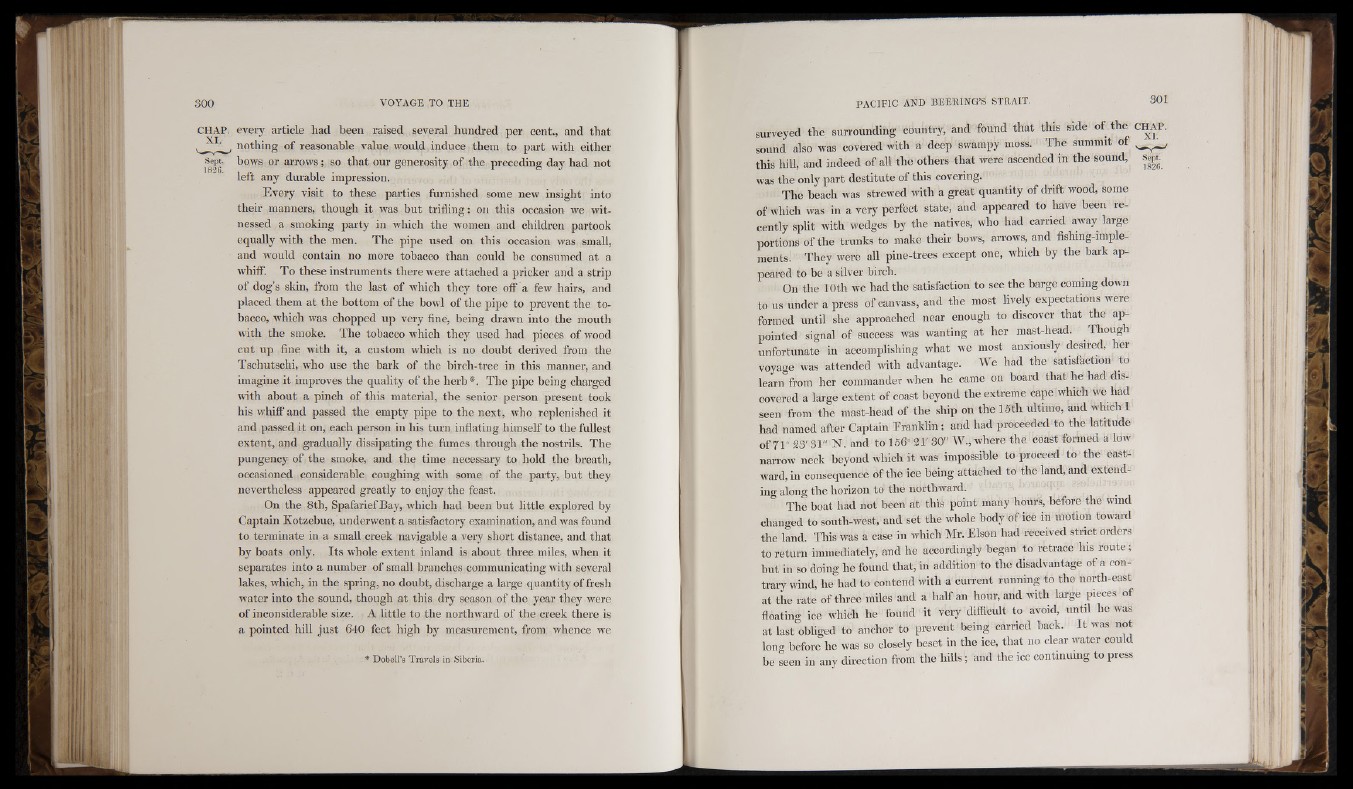
i
? r .
iii'’ 5 ;
I!' re
11 ’
ll
C H A P , every article had been raised several hundred per cent, and that
nothing of reasonable value would induce them to part with either
Sept. bows or arrows ; so that our generosity of the preceding day had not
left any durable impression.
Every visit to these parties furnished some new insight into
their manners, though it was but trilling ; on this occasion we witnessed
a smoking party in which the women and children partook
equally with the men. The pipe used on this occasion was small,
and would contain no more tobacco than could be consumed at a
whiff. To these instruments there were attached a pricker and a strip
of dog’s skin, from the last of which they tore off a few hairs, and
placed them at the bottom of the bowl of the pipe to prevent the tobacco,
which was chopped up very fine, being drawn into the mouth
with the smoke. The tobacco which they used had pieces of wood
cut up fine with it, a custom which is no doubt derived from the
Tschutschi, who use the bark of the birch-tree in this manner, and
imagine it improves the quality of the herb *. The pipe being charged
with about a pinch of this material, the senior person present took
his whiff and passed the empty pipe to the next, who replenished it
and passed it on, each person in his turn inflating himself to the fullest
extent, and gradually dissipating the fumes through the nostrils. The
pungency of the smoke, and the time necessary to hold the breath,
occasioned considerable coughing with some of the party, but they
nevertheless appeared greatly to enjoy the feast.
On the 8th, SpafariefBay, which had been but little explored by
Captain Kotzebue, underwent a satisfactory examination, and was found
to terminate in a small creek navigable a very short distance, and that
by boats only. Its whole extent inland is about three miles, when it
separates into a number of small branches communicating with several
lakes, which, in the spring, no doubt, discharge a large quantity of fresh
water into the sound, though at this dry season of the year they were
of inconsiderable size. A little to the northward of the creek there is
a pointed hill just 640 feet high by measurement, from whence we
* Dobell’s Travels in Siberia.
surveyed the surrounding country, and found that this side of the C H A P ,
sound also was covered with a deep swampy moss. The summit of
this hill, and indeed of all the others that were ascended in the sound, Sept.
was the only part destitute of this covering.
The beach was strewed with a great quantity of drift wood, some
of which was in a very perfect state, and appeared to have been recently
split with wedges by the natives, who had carried away large
portions of the trunks to make their bows, arrows, and fishing-imple-
ments. They were all pine-trees except one, which by the bark appeared
to be a silver birch.
On the 10th we had the satisfaction to see the barge coming down
to us under a press of canvass, and the most lively expectations were
formed until she approached near enough to discover that the appointed
signal of success was wanting at her mast-head. Though
unfortunate in accomplishing what we most anxiously desired, her
voyage was attended with advantage. YVe had the satisfaction to
learn from her commander when he came on board that he had discovered
a large extent of coast beyond the extreme cape which we had
seen from the mast-head of the ship on the ISth ultimo, and which 1
had named after Captain Franklin ; and had proceeded to the latitude
of 71° 23' 31" N . and to 156° 21' SO" YY"., where the coast formed a low
narrow neck beyond which it was impossible to proceed to the eastward,
in consequence of the ice being attached to the land, and extending
along the horizon to the northward.
The boat had not been at this point many hours, before the wind
chano-ed to south-west, and set the whole body of ice in motion toward
the land. This was a case in which Mr. Elson had received strict orders
to return immediately, and he accordingly began to retrace his route;
but ill so doing he found that, in addition to the disadvantage of a contrary
wind, he had to contend with a current running to the north-east
at the rate of three miles and a half an hour, and with large pieces of
floating ice which he found it very difficult to avoid, until he was
at last obliged to anchor to prevent being carried back. It was not
long before he was so closely beset in the ice, that uo clear water could
be seen in any direction from the hills; and the ice continuing to press
t o i l :
Ilii